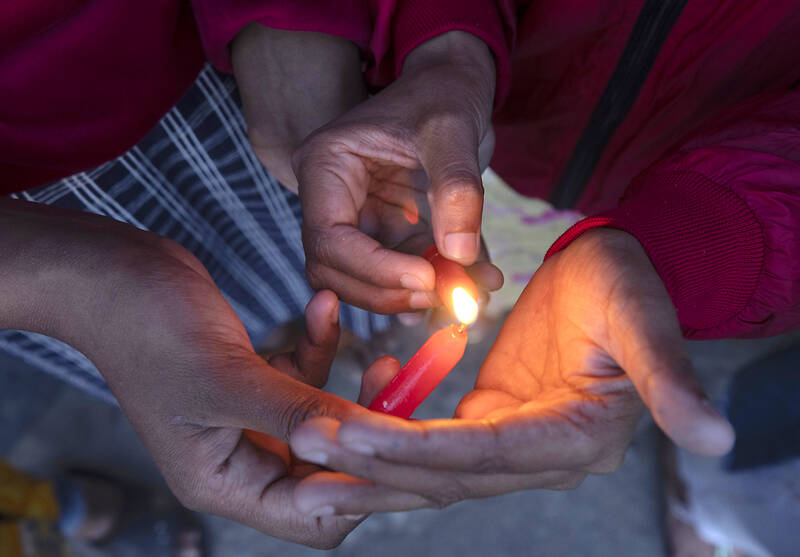Mina Chiang will give a lecture on Jan. 5 to discuss her experiences combatting human trafficking.
Chiang, the founder of UK-based Humanity Research Consultancy, will discuss her organization and how it has since its inception in 2019 adapted to changing global attitudes towards human exploitation.
The lecture, hosted by the Lung Yingtai Cultural Foundation at its offices in Taipei’s Dihua Street, is titled Empowerment & Impact: My Social Enterprise Journey and runs from 7:30pm to 9pm.

Photo: EPA-EFE
According to the United Nations Office on Drugs and Crime’s (UNODC) Global Report on Trafficking in Persons last year, cross-border trafficking fell significantly in 2020, with national reports suggesting “mobility restrictions resulting from COVID-19 containment measures may have contributed to this trend.”
Anecdotal evidence, the report says, from 2021 saw a furtherance of this trend, though lockdown measures may have simply pushed exploitation into less visible locations.
VICTIMS
The most common form of human trafficking is forced labor (38.8 percent), followed by sexual exploitation (38.7 percent). The victims of sexual exploitation are predominantly women and girls, and in some countries women make up the largest proportion of traffickers.
In some parts of the world, women trafficking women is the norm.
The report says that women and children face more violent exploitation. Female victims (women and girls) account for 60 per cent of the total number of detected victims in 2020.
BRIDGING THE GAP
With a mission to bridge the gap between clients from the global north and young professionals from the global south, Chiang’s consultancy has evolved over four years.
The consultancy is currently advising and assisting international stakeholders, including Interpol and the UNODC, and collaborating with a diverse array of international NGOs in their initiatives to end human trafficking.
The lecture and discussion will be held in English. The salon is free, but those wanting to attend must pre-register.
To register for the in-person discussion, visit: www.surveycake.com/s/zLvYY
The talk will also be screened live on Facebook. To register, go to: fb.me/e/1Lh65u3Ft
207, Sec 1, Dihua St, Taipei City (台北市大同區迪化街一段207號)
Jan. 5 from 7:30pm to 9pm.

In the March 9 edition of the Taipei Times a piece by Ninon Godefroy ran with the headine “The quiet, gentle rhythm of Taiwan.” It started with the line “Taiwan is a small, humble place. There is no Eiffel Tower, no pyramids — no singular attraction that draws the world’s attention.” I laughed out loud at that. This was out of no disrespect for the author or the piece, which made some interesting analogies and good points about how both Din Tai Fung’s and Taiwan Semiconductor Manufacturing Co’s (TSMC, 台積電) meticulous attention to detail and quality are not quite up to

April 21 to April 27 Hsieh Er’s (謝娥) political fortunes were rising fast after she got out of jail and joined the Chinese Nationalist Party (KMT) in December 1945. Not only did she hold key positions in various committees, she was elected the only woman on the Taipei City Council and headed to Nanjing in 1946 as the sole Taiwanese female representative to the National Constituent Assembly. With the support of first lady Soong May-ling (宋美齡), she started the Taipei Women’s Association and Taiwan Provincial Women’s Association, where she

Chinese Nationalist Party (KMT) Chairman Eric Chu (朱立倫) hatched a bold plan to charge forward and seize the initiative when he held a protest in front of the Taipei City Prosecutors’ Office. Though risky, because illegal, its success would help tackle at least six problems facing both himself and the KMT. What he did not see coming was Taipei Mayor Chiang Wan-an (將萬安) tripping him up out of the gate. In spite of Chu being the most consequential and successful KMT chairman since the early 2010s — arguably saving the party from financial ruin and restoring its electoral viability —

It is one of the more remarkable facts of Taiwan history that it was never occupied or claimed by any of the numerous kingdoms of southern China — Han or otherwise — that lay just across the water from it. None of their brilliant ministers ever discovered that Taiwan was a “core interest” of the state whose annexation was “inevitable.” As Paul Kua notes in an excellent monograph laying out how the Portuguese gave Taiwan the name “Formosa,” the first Europeans to express an interest in occupying Taiwan were the Spanish. Tonio Andrade in his seminal work, How Taiwan Became Chinese,